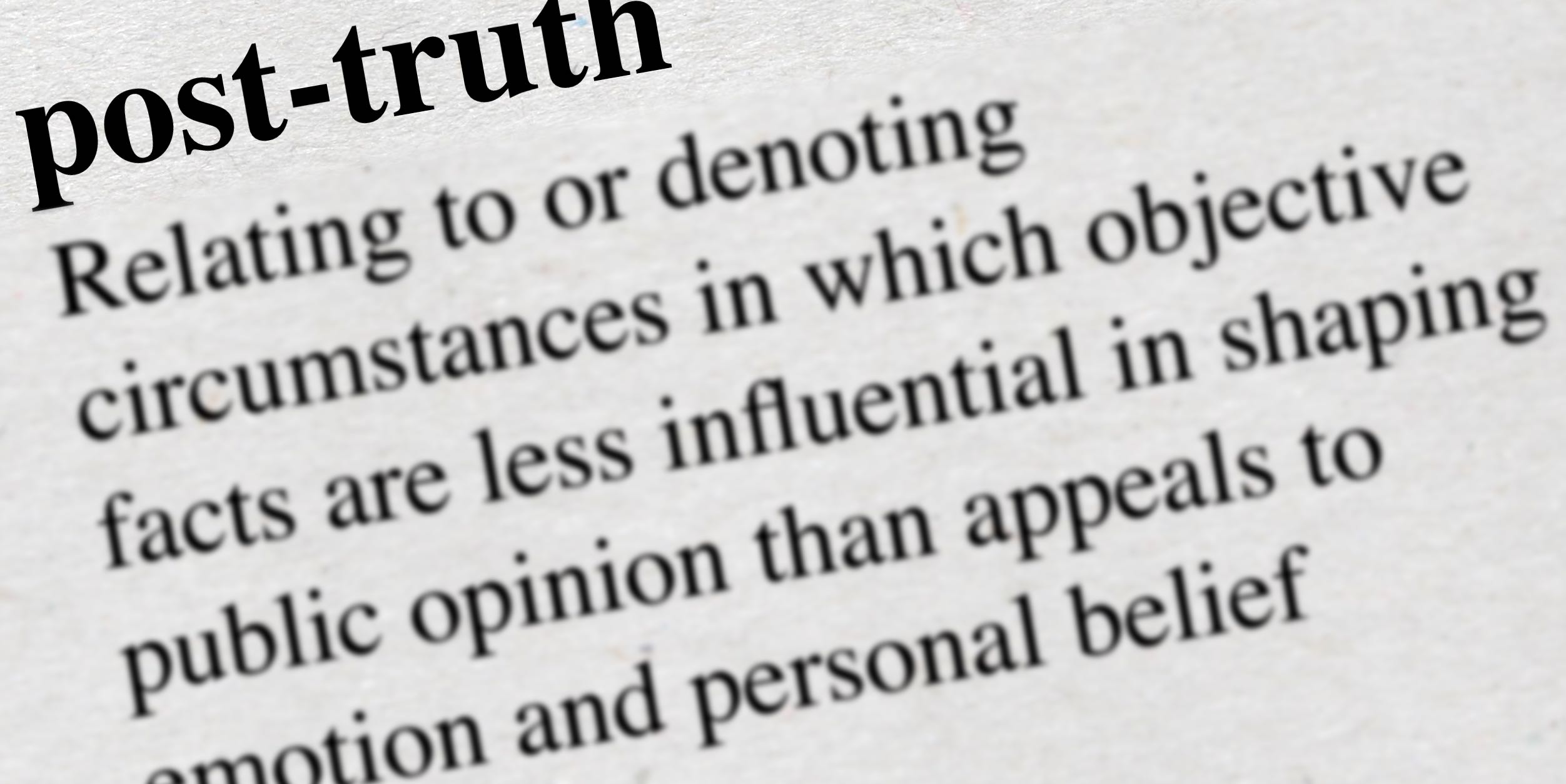Post-Truth
Relating to or denoting circumstances in which objective facts are less influential in shaping public opinion than appeals to emotion and personal belief
Each year, the Oxford English Dictionary, publishes its ‘word of the year’. This is a word that has “become prominent or notable during that [year].”1 This year that word is ‘post-truth’.
Never-mind the irony that a dictionary – bastion of promoting the true meaning of words – is publishing the word; we have to take on board the sentiment that as a society we are ‘post-truth’. But what does that mean?
It seems like only the other day when I wrote my article about mob mentality and the impact on intellectualism (see Baa I’m a Facebook User), but I feel that it is time to raise the issue again.
I believe we are seeing the fallout of a people who are attempting to define truth for themselves individually, whilst still expecting society to know what truth is corporately. We want to have a relative personal truth, as well as an absolute corporate truth. A case of having your cake, and eating it too.
You see this regularly on social media, but we are also beginning see it in the public setting. Take the recent ‘shocks’ of Brexit and Trump. Each of these, before the results of the vote, seemed to be pointing towards a landslide vote in one direction. Magazine covers heralding the news were printed 2, financial decisions were made, and people genuinely seemed to be onboard. But when the results came in – shock horror – the general public had voted the complete opposite way. Could it be that the media does not know the truth anymore? Or could it be that our ‘personal truths’ are dictating what we think are ‘corporate truths’?

It seems to me that as a society, we have a big issue brewing. On the one hand we are moulding THE truth for ourselves, whilst our other hand is outstretched asking society to tell us THE truth. This is resulting in a convoluted system of people throwing what they believe into society, hoping it’ll stick, whilst becoming more confused as to what the truth really is. I’m sure you can think of examples of this, whichever side of them you’re on, so I won’t raise them here.
A recent study has taken place in America called ‘Evaluating information: The Cornerstone of Civic Online Reasoning’ 3. The aim of this study was to see how information is distributed and then reasoned online. The results were shocking.
According to the Stanford study, more than 80% of the subjects “experience difficulty determining sponsored content from a real news story, and figuring out where the information came from in the first place”. It goes on to say “our ‘digital natives’ may be able to flit between Facebook and Twitter while simultaneously uploading a selfie to Instagram and texting a friend. But when it comes to evaluating information that flows through social media channels, they are easily duped.”
It is not just an online issue; we see the same issues around water-coolers, in our newspapers, even in our public debates. Where the previous generation had the maxim ‘you can’t trust everything you read in the newspaper’, we have ‘I read it on <insert social media here>, so it must be true’, or ‘so and so said this, so I take that as fact’.4
This has massive ramifications for all of us, in all different areas of life. From the workplace with “massaged results”, through to public news; from the latest health fad, through to our medication; from the man with a sandwich board on the high street, up to the leaders of the government in our country. We need to stop trying to define truth for ourselves. We need to stop surrounding ourselves with people who agree with us. Let’s put some thought into where truth comes from. Let’s take what we’re told, and make sure it adds up, before we even think of sharing it. We need to become ‘modern-day Bereans’ 5, daily detectives, in all areas of life, asking ourselves “Where did this information come from?”, “What are the assumptions it makes?”, “Does it make sense of the world I live in?”, “Does it add up?”.
It seems as a collective, humanity cannot find truth on their own. We either throw up our collective hands and shout from the rooftops “truth is relative!”6, or we need to let go of our malleable ideas and admit that truth has to come from beyond us.
1 https://en.oxforddictionaries.com/word-of-the-year/word-of-the-year-faqs
3 https://sheg.stanford.edu/upload/V3LessonPlans/Executive%20Summary%2011.21.16.pdf
4 It used to be a common saying between my wife and I that “I saw it on QI, therefore it’s true”.
5 The Bereans, according to the Bible, were a bunch of people who checked the facts for themselves to see if they made sense (cf Acts 17:11)
6 Which naturally defeats itself as a fact…




